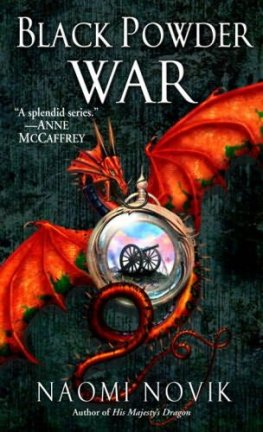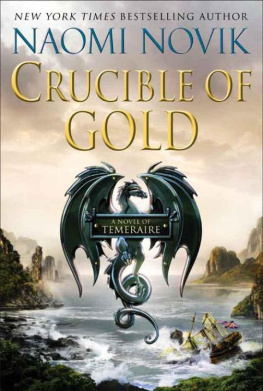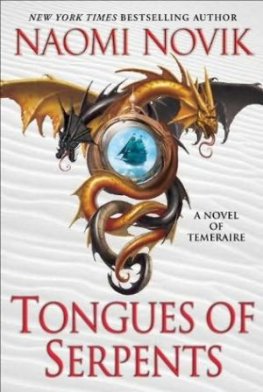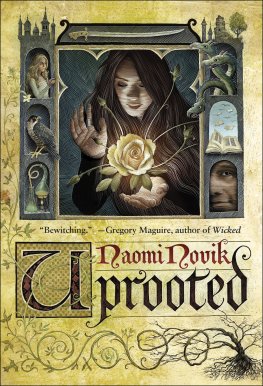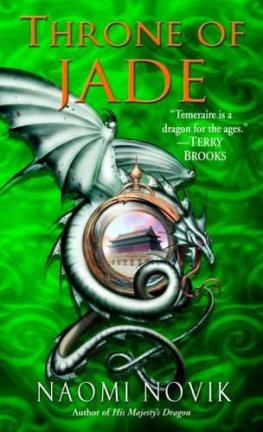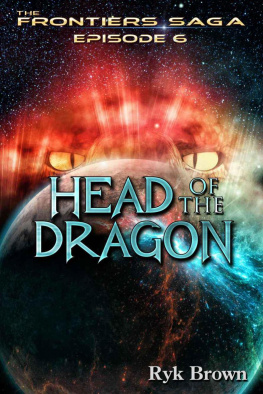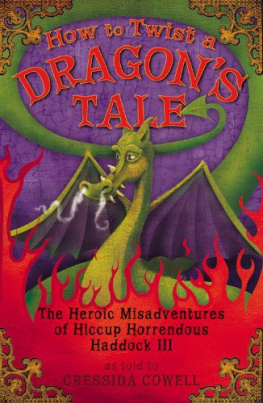Black Powder War
The third book in the Temeraire series
Naomi Novik
for my mother
in small return for many bajki cudowne
EVEN LOOKING INTO the gardens at night, Laurence could not imagine himself home; too many bright lanterns looking out from the trees, red and gold under the upturned roof-corners; the sound of laughter behind him like a foreign country. The musician had only one string to his instrument, and he called from it a wavering, fragile song, a thread woven through the conversation which itself had become nothing more than music: Laurence had acquired very little of the language, and the words soon lost their meaning for him when so many voices joined in. He could only smile at whoever addressed him and hide his incomprehension behind the cup of tea of palest green, and at the first chance he stole quietly away around the corner of the terrace. Out of sight, he put his cup down on the window-sill half-drunk; it tasted to him like perfumed water, and he thought longingly of strong black tea full of milk, or better yet, coffee; he had not tasted coffee in two months.
The moon-viewing pavilion was set on a small promontory of rock jutting from the mountain-side, high enough to give an odd betwixt-and-between view of the vast imperial gardens laid out beneath: neither as near the ground as an ordinary balcony nor so high above as Temeraires back, where trees changed into matchsticks and the great pavilions into childrens toys. He stepped out from under the eaves and went to the railing: there was a pleasant coolness to the air after the rain, and Laurence did not mind the damp, the mist on his face welcome and more familiar than all the rest of his surroundings, from years at sea. The wind had obligingly cleared away the last of the lingering storm-bank; now steam curled languidly upon the old, soft, rounded stones of the pathways, slick and grey and bright under a moon nearly three-quarters full, and the breeze was full of the smell of over-ripe apricots, which had fallen from the trees to smash upon the cobbles.
Another light was flickering among the stooped ancient trees, a thin white gleam passing behind the branches, now obscured, now seen, moving steadily towards the shore of the nearby ornamental lake, and with it the sound of muffled footfalls. Laurence could not see very much at first, but shortly a queer little procession came out into the open: a scant handful of servants bowed down under the weight of a plain wooden bier and the shrouded body lying atop; and behind them trotted a couple of young boys, carrying shovels and throwing anxious looks over their shoulders.
Laurence stared, wondering; and then the tree-tops all gave a great shudder and yielded to Lien, pushing through into the wide clearing behind the servants, her broad-ruffed head bowed down low and her wings pinned tight to her sides. The slim trees bowed out of her way or broke, leaving long strands of willow-leaves draped across her shoulders. These were her only adornment: all her elaborate rubies and gold had been stripped away, and she looked pale and queerly vulnerable with no jewels to relieve the white translucence of her color-leached skin; in the darkness, her scarlet eyes looked black and hollow.
The servants set down their burden to dig a hole at the base of one old majestic willow-tree, blowing out great sighs here and again as they flung the soft dirt up, and leaving black streaks upon their pale broad faces as they labored and sweated. Lien paced slowly around the circumference of the clearing, bending to tear up some small saplings that had taken root at the edges, throwing the straight young trees into a heap. There were no other mourners present, save one man in dark blue robes trailing after Lien; there was a suggestion of familiarity about him, his walk, but Laurence could not see his face. The man took up a post at the side of the grave, watching silently as the servants dug; there were no flowers, nor the sort of long funerary procession Laurence had before witnessed in the streets of Peking: family tearing at their clothes, shaven-headed monks carrying censers and spreading clouds of incense. This curious night-time affair might almost have been the scene of a paupers burial, save for the gold-roofed imperial pavilions half-hidden amongst the trees, and Lien standing over the proceedings like a milk-white ghost, vast and terrible.
The servants did not unwrap the body before setting it in the ground; but then it had been more than a week since Yongxings death. This seemed a strange arrangement for the burial of an imperial prince, even one who had conspired at murder and meant to usurp his brothers throne; Laurence wondered if his burial had earlier been forbidden, or perhaps was even now clandestine. The small shrouded body slipped out of view, a soft thump following; Lien keened once, almost inaudibly, the sound creeping unpleasantly along the back of Laurences neck and vanishing in the rustling of the trees. He felt abruptly an intruder, though likely they could not see him amid the general blaze of the lanterns behind him; and to go away again now would cause the greater disturbance.
The servants had already begun to fill in the grave, scraping the heaped earth back into the hole in broad sweeps, work that went quickly; soon the ground was patted level once again under their shovels, nothing to mark the grave-site but the raw denuded patch of ground and the low-hanging willow-tree, its long trailing branches sheltering the grave. The two boys went back into the trees to gather armfuls of forest-cover, old rotted leaves and needles, which they spread all over the surface until the grave could not be told from the undisturbed ground, vanishing entirely from view. This labor accomplished, they stood uncertainly back: without an officiant to give the affair some decent ceremony, there was nothing to guide them. Lien gave them no sign; she had huddled low to the ground, drawn in upon herself. At last the men shouldered their spades and drifted away into the trees, leaving the white dragon as wide a berth as they could manage.
The man in blue robes stepped to the graveside and made the sign of the cross over his chest; as he turned away, his face came full into the moonlight, and abruptly Laurence knew him: De Guignes, the French ambassador, and almost the most unlikely mourner imaginable. Yongxings violent antipathy towards the influence of the West had known no favorites, nor made distinctions amongst French, British, and Portuguese, and De Guignes would never have been admitted to the princes confidence in life, nor his company tolerated by Lien. But there were the long aristocratic features, wholly French; his presence was at once unmistakable and unaccountable. De Guignes lingered yet a moment in the clearing and spoke to Lien: inaudible at the distance, but a question by his manner. She gave him no answer, made no sound at all, crouched low with her gaze fixed only upon the hidden grave, as if she would imprint the place upon her memory. After a moment he bowed himself away gracefully and left her.
She stayed unmoving by the grave, striped by scudding clouds and the lengthening shadows of the trees. Laurence could not regret the princes death, yet pity stirred; he did not suppose anyone else would have her as companion now. He stood watching her for a long time, leaning against the rail, until the moon traveled at last too low and she was hidden from view. A fresh burst of laughter and applause came around the terrace corner: the music had wound to a close.
THE HOT WIND blowing into Macao was sluggish and unrefreshing, only stirring up the rotting salt smell of the harbor, the fish-corpses and great knots of black-red seaweed, the effluvia of human and dragon wastes. Even so the sailors were sitting crowded along the rails of the

